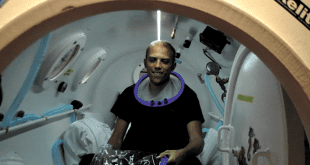Cardiac Electrophysiologists have extensive training to treat heart arrythmias. Arrythmias can cause the heart to beat in abnormal rhythms and can make the heart go too slow or too fast. While there are many different types of arrythmias, AFib (atrial fibrillation) is by far the most common and can cause bad outcomes such as stroke, heart failure etc.
More than 6 million individuals in the United States have AFib, and it takes 130,000 lives each year. The heart has 4 chambers. The upper 2 chambers are called the atria and the lower 2 are the ventricles. Normally, regular electrical signals in the upper chambers give us a normal “Sinus” rhythm. A disruption to the smooth electrical activation of the upper chambers of the heart due to irregular electrical impulses from the pulmonary veins, causes fluctuation of the heart rate and rhythm, which results in AFib.
AFib Risk Factors
The most common risk factors or triggers of AFib are obesity (being overweight), sleep apnea, heavy alcohol and caffeine use, use of energy drinks, high blood pressure, hyperthyroidism, use of illicit drugs etc. Sometimes AFib can be hereditary and can run in the family.
AFib Symptoms
• Fatigue
• Lightheaded/dizziness
• Shortness of breath
• Racing heart
• Fluttering heart
• Palpitations
• Irregular heartbeat
• Chest pain
Why is it important to recognize and treat AFib?
If left untreated, AFib can cause blood clots to form in the heart. Due to ineffective pumping of the upper chambers, blood can pool in the nooks and crannies of the heart (left atrial appendage) and form clots. If the clots break off, it can reach the brain and cause a stroke. Patients with AFib are several times more likely to have a stroke than those with normal heart rhythm.
Another potential side effect of uncontrolled AFib is congestive heart failure (CHF). If the heart is beating too fast and irregularly, it can get weak, resulting in CHF.
Patients with AFib are often prescribed blood thinners to try and protect against having a stroke. Other medications such as antiarrhythmic drugs are often necessary and can regulate the heart rhythm; however, for many patients, a surgical procedure called ablation may be necessary.
What is an ablation?
An ablation is usually minimally invasive and is performed using a catheter (insulated wire) that goes from the femoral vein (in the leg) to the heart. This is connected to the 3-dimensional mapping system which we can see on a TV monitor and helps us to accurately navigate in the heart. The patient is under anesthesia during this procedure, so they don’t feel any pain or discomfort during the ablation.
During catheter ablation, we try to map out the normal and abnormal electrical areas in the heart with the help of 3-Dimensional electro-anatomic mapping systems and cauterize the “bad” areas in the atria to isolate them from the normal heart tissue. This often allows the normal rhythm of the heart to take over and often eliminate the A fib.
Watchman:
For patients that have high risk of stroke with AFib, but also have bleeding issues and need to get off blood thinners, there is a procedure (WATCHMAN) to help prevent stroke. The WATCHMAN is guided to the heart through a needle stick in the upper thigh area and deployed in the LAA (left atrial appendage) of the heart. It prevents blood clots from going from the heart to the brain, and thereby protects patients from getting strokes.
What is a pacemaker? What is a defibrillator?
If the heart rhythm is too slow and uncontrolled by medications, a pacemaker may need to be implanted. A pacemaker prevents slow heart rates. Sometimes a pacemaker can be combined with another procedure called AV node ablation, to help with rapid heart rates also.
Sometimes uncontrolled AFib can result in a weak heart, which can lead to CHF (congestive heart failure). Patients with CHF often have difficulty breathing, develop leg edema etc. If the heart does not get stronger, these patients may need AICD (Automated Implantable Defibrillator) implantation.
What can you do to catch AFib early?
It’s important to check your heart rate every now and then for arrythmias. If you have AFib, you should check your heart rate regularly.
If you have an irregular heartbeat or other symptoms mentioned above, it’s critical to seek medical attention.
The earlier you treat your AFib, the better the long term outcomes.
Don’t wait—The heart muscle, rhythm, rate, and ability to pump correctly, is what is keeping you alive!
Shalin S. Shah, M.D.
Dr. Shalin Shah is board certified in cardiovascular disease and clinical cardiac electrophysiology. He earned his medical degree from Baroda Medical College in Baroda, India. Dr. Shah continued his medical education by completing an internal medicine residency at Henry Ford Hospital in Detroit, Michigan. He then completed a cardiology fellowship at Wright State University in Dayton, Ohio, followed by a cardiac electrophysiology fellowship from Yale University School of Medicine in New Haven, Connecticut. Dr. Shah has been in practice in the Tampa Bay area as a cardiac electrophysiologist since 2007. His primary interest is management of various arrythmias like atrial fibrillation, atrial flutter, SVT, ventricular tachycardia, advanced therapies like ablations, watchman, lead-less pacemakers, defibrillators, cardiac resynchronization therapy, left bundle branch and his-bundle pacemakers etc. An accomplished author, Dr. Shah has contributed numerous articles in peer-reviewed publications including the Journal of the American College of Cardiology and the British Journal of Clinical Governance. He is part of BayCare Medical Group serving the Tampa area, a member of the American College of Cardiology and the Heart Rhythm Society and affiliated with St. Joseph’s Hospital.
BayCare Medical Group
BayCare Medical Group Cardiology
4612 N Habana Ave Fl 2
Tampa, FL 33614
(813) 875-9000
 Central Florida Health and Wellness Magazine Health and Wellness Articles of the Villages
Central Florida Health and Wellness Magazine Health and Wellness Articles of the Villages


